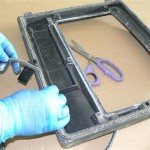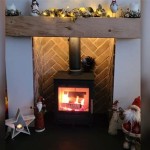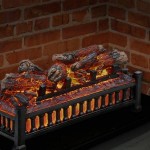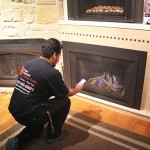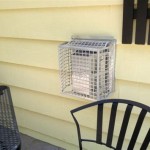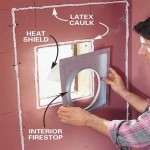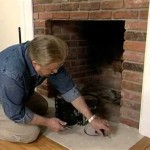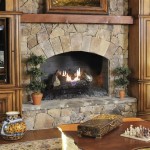Gas Fireplace Smells Like Propane: Understanding the Causes and Solutions
A gas fireplace offers a convenient and efficient way to add warmth and ambiance to a home. However, encountering a propane smell emanating from the unit can be concerning. While a faint odor upon initial ignition can be normal, a persistent or strong propane smell indicates a potential problem that requires immediate attention. Understanding the possible causes of this issue and knowing the appropriate steps to take is crucial for ensuring safety and preventing potential hazards.
Propane, an otherwise odorless gas, is intentionally infused with a chemical called mercaptan, which gives it a distinct, pungent smell often described as rotten eggs or skunk. This additive acts as a warning system, alerting individuals to the presence of a gas leak long before it reaches dangerous concentrations. Therefore, any noticeable propane smell associated with a gas fireplace should be treated seriously.
Potential Causes of Propane Odor in Gas Fireplaces
Several factors can contribute to a propane smell originating from a gas fireplace. Properly diagnosing the source is essential for implementing the appropriate corrective measures. Failing to address the underlying issue can lead to persistent safety concerns and potential health risks.
1. Minor Leakage During Initial Ignition: When a gas fireplace is initially ignited after a period of inactivity, a small amount of unburned propane may be released. This is often due to the gas line needing to be purged before the flame ignites completely. The resulting odor is usually faint and dissipates quickly once the fireplace is operating correctly. This is often considered normal, especially in fireplaces that haven’t been used for an extended period, such as during the warmer months.
However, even in this situation, it's important to be vigilant. If the smell persists for more than a few minutes or is particularly strong, it should not be dismissed as normal and further investigation is warranted. A small leak during ignition could potentially worsen over time, turning into a significant hazard.
2. Gas Leaks in Connections or Fittings: A more serious cause of propane odor is a gas leak within the fireplace's connections or fittings. These connections can become loose over time due to vibration, temperature fluctuations, or general wear and tear. Corrosion can also compromise the integrity of the gas lines and fittings, leading to leaks. The odor may be more prominent near the leaking connection, providing a clue as to its source.
Connections to inspect include those at the gas supply line, the regulator, the burner assembly, and the pilot light. Any sign of rust, discoloration, or damage around these connections should be noted. Even a small leak at a connection can create a noticeable odor, especially in a confined space.
3. Malfunctioning Gas Valve or Regulator: The gas valve controls the flow of propane to the fireplace, and the regulator maintains a consistent gas pressure. If either of these components malfunctions, it can result in an irregular or excessive release of propane, leading to a noticeable odor. A faulty gas valve might not completely shut off the gas supply, allowing a slow leak even when the fireplace is turned off. Similarly, a malfunctioning regulator could deliver too much propane to the burner, causing incomplete combustion and increased odor.
A malfunctioning gas valve can sometimes be identified by listening for a hissing sound near the valve, even when the fireplace is off. A faulty regulator may cause the flame to be unusually high or unstable. Both scenarios warrant immediate professional attention.
4. Incomplete Combustion: Incomplete combustion occurs when propane is not burned efficiently, resulting in the release of unburned hydrocarbons, including propane. This can happen if the fireplace is not properly ventilated, if the burner is dirty or obstructed, or if the air-to-fuel mixture is not balanced correctly. The odor associated with incomplete combustion can be different from the pure propane smell, sometimes described as a smoky or sooty odor accompanying the propane scent.
Factors that can contribute to incomplete combustion include a dirty burner assembly, blocked air vents, or a malfunctioning oxygen depletion sensor (ODS). Regular cleaning and maintenance of the fireplace can help prevent incomplete combustion and ensure efficient burning of propane.
5. Issues with the Chimney or Venting System: A properly functioning chimney or venting system is essential for expelling exhaust gases, including any unburned propane, from the fireplace. If the chimney is blocked, damaged, or improperly installed, it can cause a backdraft, forcing the exhaust gases back into the living space. This can result in a strong propane odor and potentially dangerous levels of carbon monoxide.
Common causes of chimney blockages include bird nests, debris buildup, and structural damage. These blockages can restrict airflow and prevent the proper venting of exhaust gases. Regular chimney inspections and cleaning are crucial for maintaining a safe and efficient venting system.
Steps to Take When You Smell Propane
Upon detecting a propane smell, immediate action is necessary to mitigate potential risks. The following steps should be taken promptly and carefully to ensure safety and prevent further complications. These steps are applicable regardless of the suspected source of the leak; prioritizing safety is paramount.
1. Extinguish All Flames and Heat Sources: The first and most critical step is to immediately extinguish any open flames or heat sources in the vicinity. This includes candles, cigarettes, and any other potential ignition sources. Even a small spark can ignite propane vapors and cause an explosion. Turn off the gas fireplace immediately.
2. Evacuate the Area: Evacuate the building or the immediate area where the propane smell is present. This ensures that no one is exposed to potentially dangerous levels of propane. If possible, open windows and doors to ventilate the area and dissipate the gas. Once safely outside, refrain from re-entering the building until the issue has been properly addressed and the area is deemed safe.
3. Do Not Operate Electrical Switches or Devices: Avoid operating any electrical switches, appliances, or devices, including telephones and light switches. These devices can produce sparks that could ignite propane vapors. Even seemingly innocuous actions like turning on a flashlight or using a cell phone can pose a risk in a propane-rich environment. Use a phone outside the building to contact emergency services.
4. Contact Qualified Professionals: Immediately contact a qualified gas technician or the local fire department. These professionals have the expertise and equipment necessary to safely locate and repair gas leaks. They can also assess the situation and determine whether it is safe to re-enter the building. Provide them with as much information as possible regarding the location and intensity of the propane smell.
5. Do Not Attempt DIY Repairs: Under no circumstances should anyone attempt to repair a gas leak without proper training and experience. Gas line repairs require specialized tools and knowledge, and improper repairs can create a hazardous situation. Tampering with gas lines or equipment can lead to serious consequences, including explosions, fires, and carbon monoxide poisoning. Always rely on qualified professionals to handle gas line repairs.
Preventative Maintenance for Gas Fireplaces
Regular maintenance is crucial for preventing propane leaks and ensuring the safe and efficient operation of a gas fireplace. A proactive approach to maintenance can help identify potential problems before they escalate into serious hazards. Regular inspections and cleaning will extend the lifespan of the unit and protect the well-being of the occupants.
1. Annual Inspections: Schedule an annual inspection by a qualified gas technician. The technician will inspect the gas lines, connections, burner assembly, venting system, and other critical components of the fireplace. They will also perform a safety check to ensure that the fireplace is operating correctly and that there are no potential hazards. This annual inspection can identify issues that may not be apparent during regular use.
2. Regular Cleaning: Clean the fireplace regularly to remove dust, debris, and soot buildup. This will help prevent incomplete combustion and ensure optimal performance. Use a soft brush or vacuum cleaner to clean the burner assembly, logs, and surrounding areas. Follow the manufacturer's instructions for cleaning specific components of the fireplace.
3. Check Venting System: Inspect the chimney or venting system regularly for any signs of blockages or damage. Clear any debris, such as bird nests or leaves, from the chimney. Ensure that the vent cap is in place and that the vent is properly sealed. If you notice any damage to the chimney or venting system, contact a professional for repairs.
4. Carbon Monoxide Detectors: Install carbon monoxide detectors throughout the home, especially near the fireplace. Carbon monoxide is a colorless, odorless gas that can be produced by incomplete combustion. Carbon monoxide poisoning can be fatal, so it is essential to have working detectors to alert you to the presence of this gas. Test the detectors regularly to ensure that they are functioning properly. Replace the batteries in the detectors at least once a year, or according to the manufacturer's recommendations.
5. Educate Household Members: Ensure that all household members are aware of the potential dangers associated with gas leaks and how to respond if they smell propane. This includes knowing the proper steps to take in the event of a leak, such as extinguishing flames, evacuating the area, and contacting emergency services. By educating everyone in the household, you can increase the likelihood that a gas leak will be addressed promptly and safely.
Addressing a propane smell from a gas fireplace requires careful attention to detail and a commitment to safety. By understanding the potential causes, knowing the appropriate steps to take, and implementing preventative maintenance measures, individuals can minimize the risk of gas leaks and ensure the safe and enjoyable operation of their gas fireplaces. Prioritize safety and always seek professional assistance when dealing with gas-related issues.

Here S Why Your Gas Fireplace Stinks Full Service Chimney

Here S Why Your Gas Fireplace Stinks Full Service Chimney

Why Does My Propane Fireplace Smell Like Kerosene All Valley Repair

Why Do My Gas Logs Smell Foster Fuels

Why Does My Gas Fireplace Smell Dreifuss Fireplaces

Gas Fireplace Leak Symptoms What To Watch Out For Dreifuss Fireplaces

Gas Fireplace Odor

Here S Why Your Gas Fireplace Stinks Full Service Chimney

How To Make A Gas Fireplace More Like Wood Burning One Ehow

Propane Fireplace Maintenance Premier Companies
Related Posts

